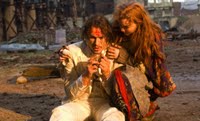 I don't remember when I saw Se7en, the most recent of these films. For years, I'd heard it mentioned, and it seemed that its reputation was growing, because every time somebody mentioned it, it would sound a little more reverent than the last time. When I finally got around to seeing it, it was every bit as harrowing as its reputation suggested. Fincher's bleach bypass colors and uncomfortable intimacy with the killer and his victims -- these were the groundwork for a vicious, merciless film experience. Despite the gruesome imagery and shock tactics, it's still the conclusive conceptual twist that I remember best... perhaps the only payoff that could have lived up to the film's escalation.
I don't remember when I saw Se7en, the most recent of these films. For years, I'd heard it mentioned, and it seemed that its reputation was growing, because every time somebody mentioned it, it would sound a little more reverent than the last time. When I finally got around to seeing it, it was every bit as harrowing as its reputation suggested. Fincher's bleach bypass colors and uncomfortable intimacy with the killer and his victims -- these were the groundwork for a vicious, merciless film experience. Despite the gruesome imagery and shock tactics, it's still the conclusive conceptual twist that I remember best... perhaps the only payoff that could have lived up to the film's escalation.To me, this is the essential Fincher movie, and the most successful Brad Pitt has ever been in playing a (deadly) serious role. It's also one of Kevin Spacey's major achievements, as he becomes the case study for soft-spoken introversion as something purposeful and terrifying.
There was an element of expectation involved in my viewing of Se7en, but not nearly so much as there was with the other two Great Sevens, Seven Samurai and The Seventh Seal. These two totally definitive films are burdened with a common weight: the reputation for being impossibly slow and difficult to sit through. Having finally seen both of them, I can say definitively, I find this characterization to be a little unfair.
Now, if you're not used to old movies in general, you need to know: the current pace of filmmaking has changed dramatically in the past forty years, and even more so in the past ten. So honestly, you may find any movie created before 1980 to be rather slow, and as for the ones created back before 1960? Until you've learned a little bit of patience, those might seem totally insufferable.
But I'll tell you straight: Seven Samurai is a heavy undertaking, but it isn't slow. And The Seventh Seal, even more so, is totally misunderstood... for something jam-packed with existentialism, it actually moves along pretty evenly.
 Of these three Great Sevens, Seven Samurai is the most epic, the most adventuresome, and the most heroic. It's also reputedly extremely difficult to sit through, possibly because it's almost three and a freaking half hours long, including an intermission in the middle. Make no mistake: it will take up a chunk of a day, and if you want to see it, I'd recommend setting aside a whole afternoon, with some buffer time to take a break or two, stretch, get food, and pee. This is how I got through it in essentially one sitting... I made the space for it, and I made myself comfortable.
Of these three Great Sevens, Seven Samurai is the most epic, the most adventuresome, and the most heroic. It's also reputedly extremely difficult to sit through, possibly because it's almost three and a freaking half hours long, including an intermission in the middle. Make no mistake: it will take up a chunk of a day, and if you want to see it, I'd recommend setting aside a whole afternoon, with some buffer time to take a break or two, stretch, get food, and pee. This is how I got through it in essentially one sitting... I made the space for it, and I made myself comfortable.However, don't let the bad press fool you... Seven Samurai doesn't have the ponderous slowness of Brown Bunny or 2001, which are replete with atmospheric shots of objects moving through space, people sitting in reflective silence, and other sorts of cinematic images that may as well be still photos. Seven Samurai has a story that always moves.
So it's 207 minutes long, and yet it moves along the whole time? Well, if distance=rate times time, and the movie moves at a good clip for 207 minutes, it must mean it covers a hell of a lot of distance. This is, in fact, the case: this story is extraordinarily elaborate, with copious numbers of important characters, all working out minor relationships and developments. This is the kind of in-depth plot and rising action that we, as modern consumers, are only used to seeing in serial television. It's not too much of a stretch to imagine the film being broken into a nine- or ten-episode series, and each episode being accessible and engaging.
This far-reaching story, revolving around the complex personal politics of the medieval samurai, provides ample space for the central dialectic of the film, a discourse on loyalty and individualism that engages Western sensibilities of heroics, leadership, and subversion with Eastern ideals of commitment and self-sacrifice. Any mention of the film will always immediately evoke its final image... a reflection on an ensemble of warriors, united in duty and divided by fate.
 The third "Seven" movie is the one I saw tonight, The Seventh Seal. Like Seven Samurai, The Seventh Seal has the universal reputation for being extremely slow, artsy, and pretentious. In Seventh Samurai, this reputation is partly because of the length and complexity; in Seventh Seal, it's harder to explain. The movie clocks in at a lean 96 minutes, and it's essentially a story of a veteran knight of the crusades, traveling home through the European countryside, and discovering the human spirit within the wasteland of the plague. He only makes it as far as he does because he distracts Death with a game of chess... so yes, there's some "symbolism" here, and some reflection on the nature of good and evil and faith, but this is not a philosophical tract over a game board. This is a movie about some good people and some not-so-good people, and about their adventures.
The third "Seven" movie is the one I saw tonight, The Seventh Seal. Like Seven Samurai, The Seventh Seal has the universal reputation for being extremely slow, artsy, and pretentious. In Seventh Samurai, this reputation is partly because of the length and complexity; in Seventh Seal, it's harder to explain. The movie clocks in at a lean 96 minutes, and it's essentially a story of a veteran knight of the crusades, traveling home through the European countryside, and discovering the human spirit within the wasteland of the plague. He only makes it as far as he does because he distracts Death with a game of chess... so yes, there's some "symbolism" here, and some reflection on the nature of good and evil and faith, but this is not a philosophical tract over a game board. This is a movie about some good people and some not-so-good people, and about their adventures.Perhaps The Seventh Seal has been pigeon-holed as a slow movie because it's also been characterized as an artsy movie... which is probably because the main character, a knight having a crisis of faith, tends to ask his philosophical questions very directly. He likes to talk about God, the devil, and the failure of faith, and he occasionally uses the other characters as sounding boards to make dramatic speeches. As Roger Ebert pointed out, this is historically equated with over-philosophizing, and with the kind of comedic melodrama that invites parody after parody. However, it's worth noting that the film is actually among Bergman's most accessible... for me, it beats out Persona, which is intimidatingly cryptic, but also such meandering dramas as Wild Strawberries and The Hour of the Wolf.
Funny that a brief movie, full of small adventures and entertaining characters, is so widely considered slow and pretentious; or that it's considered cryptic when it addresses its themes out in the open, with no obfuscation.









